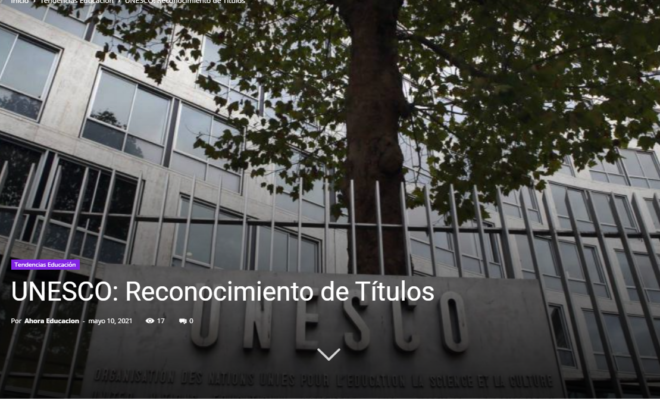The New Regional Convention: an open door to innovation and cooperation

The Virtual Forum “The New Regional Convention: challenges and opportunities for its implementation” opened with welcoming remarks from the director of the UNESCO International Institute for Higher Education in Latin America and the Caribbean (IESALC), Francesc Pedró, who presented a global framework of the New Regional Convention that awaits ratification by at least four UNESCO signatory States.
Francesc Pedró explained that the Convention is an instrument of academic diplomacy with the advantage of formalizing what already exists and anticipating what will be found in the future, such as micro-credentialism or the intensive use of technologies. It includes a set of agreed principles for a common approach to recognition processes in the region.
Among other advantages, he mentioned that it would help streamline processes to coordinate regional policies and institutional responses to protect the rights of students, migrants and refugees, and provide the capacity to build a regional knowledge community that will strengthen academic and research networks.
He warned that only 38% of students from the region who leave their countries continue their studies in the same geographic bloc, that is, between 1/3 and 2/3 of the human capital goes to other countries. The ratification and entry into force of this Agreement will provide an additional attraction to leverage intraregional student mobility.
With the Convention’s ratification, the Institute will provide its secretariat, which will enable it to promote the development of subsidiary texts that favor convergence in the criteria for recognition between countries and mutual understanding of the region’s higher education systems.
José Antonio Quinteiro (JAQ), program coordinator of UNESCO IESALC, moderated the forum. María José Lemaitre, executive director of the Inter-University Center for Development (CINDA), and Paulo Falcón, former national director of University Management of the Ministry of Education, Culture, Science and Technology of Argentina, participated as experts.
JAQ: Why do you think it was so difficult to operationalize the 1974 Convention, and why is it so difficult to ratify the New Regional Convention, even though there is sufficient evidence of the benefits that its ratification would bring?
María José Lemaitre (MJL): I would highlight three factors that make it difficult: the lack of mutual trust; the door to competition that the recognition of degrees opens since it would enable to enter into professional practice; and a third one that has to do with the actors who sign and decide on its ratification, which are the governments, while those who mainly conduct the recognition process are the national universities. If the universities do not participate in the signing ofa convention of this kind, there is not much progress.
Paulo Falcón (PF): This is an essential characteristic of the international policy of our countries, where education is marginal in many of our international policies. States have other priorities and urgencies above higher education and recognition. Mercosur, as a political and social bloc, generated agreements in the 90s and only in 2018 was it possible to agree on professional performance on recognized careers. It is necessary to put it back on the public agenda.
JAQ: What have been the success factors that have allowed Europe to advance in this area, to the point that the ministers of education announced in 2018 the automatic recognition within the European Higher Education Area by 2025? Why did the Lisbon Convention advance and we are so far from reaching the same stage of development?
JML: The European success has to do essentially with a regional political agreement; there is a European Union with resources, programs such as Erasmus+, unlike Latin America, where there are no funds or integrated management. The European effort aims to become the destination for international students, while Latin America is not the preferred destination even for Latin Americans.
We do not have a regional higher education space. Public universities do not sit at the same table as private, university and non-university universities. There is an issue of dispersion, of heterogeneity, which we have not been able to solve. National higher education spaces are absent, contrary to Europe, where there is a certain homogeneity.
FP: Not all European Space generates easy and simple recognition mechanisms for credits and degrees. There are countries that have embryonic quality assurance mechanisms, mainly in Eastern Europe. Europe can be seen as a process of construction, debate, generation of policies and agreements and it is precious to have it as a process of generating policies and agreements as a reference for Latin America and the Caribbean.
The Regional Convention could be seen as a possible break in the region’s history of disagreements, since it aims to facilitate the recognition of studies, and it also generates an instrument for harmonization and convergence, and I am therefore optimistic.
The New Convention: a driving force for international cooperation

JAQ: How could the New Regional Convention favor the circulation of talent in our region?
PF: Studies must illustrate people’s knowledge. To recognize professions is to dignify people. The recognition of qualifications must be interpreted as a human right, and institutions must be more attentive and respectful.
JAQ: Could the New Convention, through further developments, recognize unfinished educational trajectories and open a door that privileges access to higher technical-professional education (ESTP), always associated in our region with less prestige than universities, but now very much in demand in countries such as Chile?
MJL: There are lessons learned and worthwhile experiences; in Chile, the so-called “Relevant Knowledge Exam” applies in some universities, but it is optional. Quality assurance should encourage HEIs to be able to certify the competencies of their graduates.
FP: In the New Regional Convention, the concept of a diploma supplement was included, including a standardized description of the nature, level, content and competencies acquired by its holder. Today’s society is leading us to other types of needs; if citizens are trained to participate in society, they must be equipped with soft skills to live better lives, as the 2030 Agenda aspires.
JAQ: A recent survey of 6,000 students interested in moving to Australia, Canada, New Zealand and the United States of America showed that only 10% of respondents would be willing to pursue their degrees 100% online, while 43% would start online if they were then assured of being able to attend in person. On the other hand, 31% responded that they would prefer to defer their mobility. In other words, “virtual mobility” seems to be an imperative imposed by the pandemic. Given this, we may reach 8 million mobile students in 2025 in a post-pandemic context, as projected by UNESCO. What is your reading of this scenario and what can we do to make the States recognize the urgency of ratifying the New Regional Convention?
MJL: The scenario will not be one of virtual mobility since the quality of this learning is unknown, and the cultural impact of physical mobility is lost. It is necessary to analyze significant learning on remote training to ensure relevant learning. The virtualization of education requires a serious and deep reflection on what we have learned during this time of pandemic … The New Regional Convention could suggest ways to do so, generate incentives and spaces of dialogue between all stockholders involved.
RELATED ITEMS








